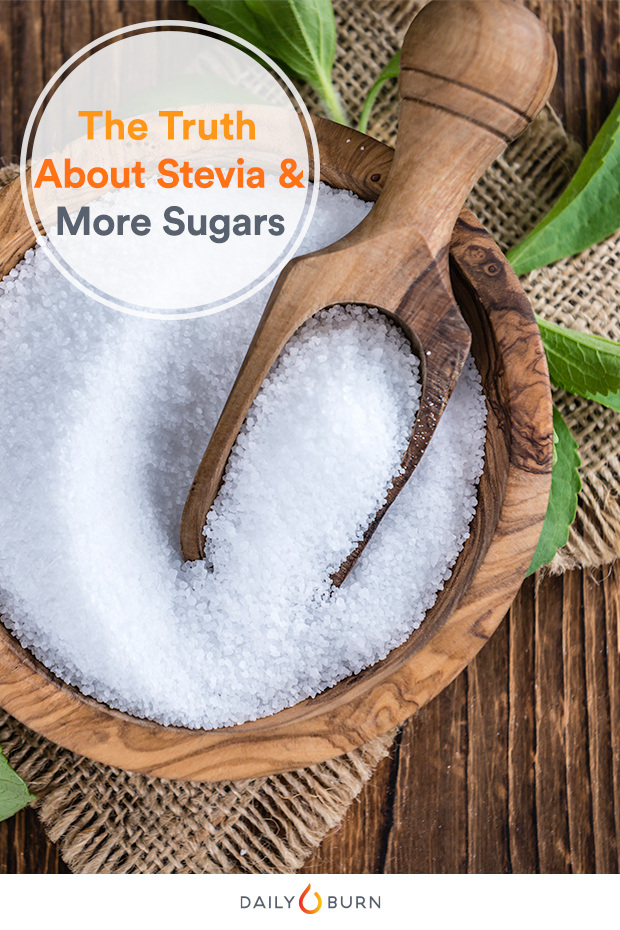
With the “I Quit Sugar” revolution in full force, most of us are aware that too much of the sweet stuff can be bad news for our waistline, heart health and overall well-being. As a result, many food manufacturers and home chefs turn to natural sweeteners in an effort to minimize the negative effects. But are these alternatives actually any healthier than plain old white sugar, and if so, which ones are your best bets?
RELATED: 35 Sneaky Nicknames for Sugar You Need to Know
The No Sugar-Coated Truth
First, let’s face facts. “Products contain sugar because it tastes good,” says Vianesa Vargas, a nutritionist and founder of Halftime Foods. “Our tongues are naturally attracted to foods that are sweet, salty and to some extent, have fat.” Human evolution has caused us to naturally crave sugar — an easily accessible energy source. But unfortunately for modern man, storing excess sugar becomes fat for later use.
When we consume a lot of sugar, there is an abrupt increase in blood sugar level. The body responds by producing a large quantity of insulin, which helps process the sugar. And when your insulin levels are too high, the crash can brutal. The even bigger downside is that these spikes are bad for the organs that digest sugar, and they leave us hungry for — you guessed it — more sugar.
“Sugar is natural, fat is natural, salt is natural.”
“Sugar is natural, but the way it’s processed has become the problem,” says Vargas. While our ancestors had to hunt and gather their sweet calories, we can get them from highly processed foods like white sugar and high-fructose corn syrup. This is where natural sugars come in. Many medical professionals maintain that sugar in its natural form — like fruit or other whole foods — is perfectly healthy, and even added sugars are OK in moderation. So if you’re looking to swap processed sugar for the natural stuff, here’s what you need to know.
RELATED: The Best Forms of Sugar to Eat Pre-Workout
Maple Syrup
Maple syrup doesn’t cause a sharp spike in blood sugar like regular sugar does, says Vargas. Plus it’s got a whopping 54 beneficial compounds that could help keep you healthy. Just be sure to avoid table syrup or pancake syrup, which does not provide any of the nutritional upsides of maple syrup. Also keep in mind that a little goes a long way. Just one ounce of syrup contains over 70 calories. So it’s a good choice for foods that need just a little sweetness and would benefit from its distinctive flavor, like salad dressing or roasted veggies.
Honey
Like maple syrup, honey is also easy on blood-sugar levels, says Vargas. It also has a host of other potential benefits, like soothing coughs and possibly even helping to reduce the effects of seasonal allergies (though the research there is still inconclusive). Vargas warns, though, that cooking with honey (aka heating it) will nix some of the pros.
RELATED: How to Do a Sugar Detox (Without Going Crazy)
Stevia
Stevia is a natural sweetener that comes from the stevia herb. It’s significantly sweeter than sugar, but it’s calorie-free and doesn’t cause the dreaded sugar spike and crash. However, Vargas notes, “The problem with stevia is that it hasn’t been around that long. It’s too new of a product to know how it will affect the body.” While natural stevia may be a good choice, essentially all stevia found in grocery stores is processed (whether it’s in powder or liquid form). To get the natural version of stevia, you would have to grow the plant in your own garden or purchase stevia leaves from a natural food retailer. Plus, using such an intensely sweet sugar substitute doesn’t reduce the underlying craving for sweetness.
Monk Fruit Extract
Haven’t heard of monk fruit sweetener? It’s the new kid on the no-calorie sweetener block. Harvested from a Southeast Asian fruit, it is calorie-free and does not affect blood sugar. Popular in packaged foods, it’s been deemed totally safe to eat and is a good option for people with diabetes. However, Vargas notes, “The problem isn’t only with the sweeteners, but with the other ingredients added into products.” If you’re purchasing a packaged food with monk fruit sweetener, look out for other additives like preservatives, other sweeteners and MSG.
RELATED: This Tool Helps You Visualize Your Body on Sugar
Raw Sugar
Sometimes the best bet for baking and cooking is really just sugar. While it’s not necessarily good for you, as Vargas says, “We know what sugar does.” If you’re baking a cake or a pie from Grandma’s recipe, she says, just cut the amount of sugar in the recipe in half and use raw sugar. While raw sugar is nutritionally almost identical to white sugar, it is easier on the environment, since it’s less processed.
At the end of the day, eating healthy doesn’t have to mean cutting out every ounce of sugar. As long as we are aware of what and how much we’re eating, it’s possible to consume sugar. After all, as Vargas says, “Sugar is natural, fat is natural, salt is natural.”
